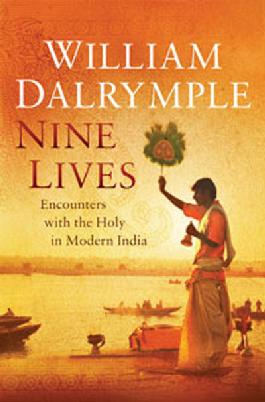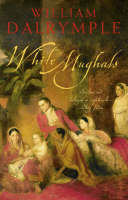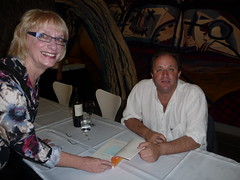William Dalrymple: eating, drinking, chatting, chasing
Roberta Smith interviewed William Dalrymple as part of the Auckland Writers and Readers Festival 2010.
See our Festival coverage on the blog including:
- William, I really enjoyed your presentation at the Festival last night and I’m impressed by how multi-skilled authors have become. It’s not only about writing any more, or is it?
Well ultimately it is all about writing, that’s the beginning and the end of it really. I mean, if you can’t write, the other stuff doesn’t count. But there is no question that presenting your work is now as much as a quarter of your job in the sense that most of us turn out a book every three or four years and the third or fourth year, if you are lucky enough to have your books sell all over the world, it can easily use up the best part of a year travelling around to market it.
Over the past year, I’ve toured Britain, India, Pakistan, Bangladesh and Sri Lanka, I’ve done two trips to Australia and then spent the summer in the States.
- And you enjoy all this travelling?
- I do, I mean, it does get wearying at times. I do with this one in particular because I’m doing it with all the people in the book, they are all coming to Sydney Opera House.
- Let's talk a bit about Nine Lives: In Search of the Sacred in Modern India, you apparently took twenty five years to get these nine lives together?
- Well not in the sense that most of these books take three to four years to write; this one took about two years but it draws on the accounts of lives that I have collected over the past twenty-five years.
- How easy is it to get to know characters like this?
- Well, it depends on the characters. For the nine interviews that have ended up in this book, I must have started on a couple of hundred.
- How did you select?
- They selected me as much as anything else. The person who was inclined to tell the story to you and to give the detail tends to be in the book. Some people for very good reasons aren’t prepared to talk, there are all sorts of private, sexual, political reasons why this may be. It’s a minority of people who have got the time and the willingness to do that.
- How did you even know of the existence of these people?
- It varied, in the case of the Bauls for example I’d heard Papan Das Baul’s music and had a friend who knew him. In the case of The Idolmakers, I’d heard of them and just turned up at the shop. Some I met at other festivals This is a very random selection, no means is it scientific in any way. It is very personal, for instance, I like Baul music and I like bronzes, so they are there.
- Why these nine?
- Ultimately because they were the best stories. If someone was more articulate and extraordinary things had happened to them, that made a better story than one from an inarticulate person who didn’t really talk about his personal life and so one didn’t really get an insight into that world. It was very much on the quality of the interviews.
-
 Is there any significance to the order of the stories?
Is there any significance to the order of the stories? - No, nor the number nine! Even though nine is very sacred number in Hinduism. And no, it’s got nothing to do with cats having nine lives or reincarnation either.
- Almost all of these stories take place in rural India, what’s the state of the sacred in urban India?
What this book is really about is the traditional forms of religiosity and how they are changing in the face of modernity. Religion in cities in India tends to be much more straightforward and orthodox in both Islam and Hinduism. It is the most mainstream, austere, modernised form of the faith that you find in the cities.
What interests me is what is happening to the little regional variants, the small godlings, the local epics, the regional forms of incarnating deities. The full width and richness of traditional Hinduism is being lost to more conformist, more centralised, more urban, more middle-class and becoming less regional, less village, less superstitious.
- The moment you divide a book into sections like this, you lay yourself wide open to people preferring one episode over the other. Is there a particular one of these lives, stories or spiritual paths that appeals most to you?
- This book is not me in search of a guru. It is not my story about my religious search. It is very consciously not that.
- I loved the illustrations your wife did for the book Nine Lives, but I did wonder why there were no pictures/ photos in the book.
- That was actually an accident. I’ve been a very keen photographer and in my early travels, my books are full of my photographs. I have won prizes for my photography. But I haven’t totally made the transition to digital photography – I used to be a real darkroom man, the smell of fixer… and the honest truth is I forgot to bring my camera on quite a lot of these trips. Increasingly travel is associated with the image and I think it is quite good for the literary travel book in principle not to have pictures. In fact this is my only book not to have photographs.
- Will readers who admired your previous books love this book?
- I think it is very important for any form of artist not to get stuck. I’ll just repeat that without a biscuit in my mouth! So inevitably, you are going to lose some and you are going to gain some. I would feel very disappointed if I was still doing retreads of In Xanadu thirty years down the line. You have to move on.
-
 Are we likely to ever get an autobiography out of you?
Are we likely to ever get an autobiography out of you? - I don’t think anyone should write their autobiography until they are at least in their sixties or seventies, so I’m going to wait a bit. It’s the kind of thing people do when they read the Autumn of their lives and look backwards. I’m forty five now – I’m not against the idea but it is certainly not on my immediate to-do list. Actually, there is a measure of autobiography in all these books. In White Mughals with Brits going native in India, there was a measure of self enquiry inherent. Writer’s books even when they’re not autobiographies strictly are collectively a form of autobiography.
- What are libraries in India like?
- There are very few lending libraries in India. It is a very elitist society in all sorts of ways, this shows itself in a variety of forms from caste-based tea shops in the village through to the way that India has very very bad primary education for the poor but absolutely first class tertiary education for the elite. The old sort of idea of a library for all is very rare in India. They do exist and there are good examples, but most libraries I can think of are more elitist institutions attached to Universities or Scholarly Societies or the Indian Council for Cultural Research.
- Do your children belong to a library, do they use libraries?
- My children belong to their school library and borrow books from there. As for myself, I am a member of a wonderful institution called the London Library which is an extraordinary institution, it is a private library which has quite a hefty membership fee of about 120 pounds a year (about $240). It works - you are allowed to borrow up to nine books indefinitely until other readers want them. It means you take a great stack of books home and write your book at home! If you are a country member they can be couriered to you, strictly speaking you are not allowed to take them out of the country, but I have infringed on that, I suppose this will get on some central librarians blog now and I’ll be exposed!
- Libraries are changing from a focus on books to a focus on technology, computers, WiFi access, CDs and DVDs – what do you feel about that as a direction in libraries?
- It’s working to my benefit because I seem to be buying up all the old rejected library stock. Histories that have been thrown out of libraries in New Zealand or Australia or America and they’ve all ended up in my library at home. But seriously, I think libraries should be about books and I think it is very important that as more and more goes on the web, It seems a shame for a small library to sell off all its ancient library stock to buy DVDs and computers which are then used by the kids to play video games or piss around downloading music or worse!
- If you were in charge of a municipality and had to make choices as to whether your small budget would go towards medical facilities or go towards library facilities, what would your decision be?
- I think libraries are incredibly important particularly for those who are not rich enough to buy large quantities of books themselves. I think they are major feeders of the mind and the mind is as important as the body. To be starved of intellectual stimulation is as bad as to be starved of good medical care. For the medical lobby to say that the body is the only important thing is a tragedy. There are many many cases of great intellectuals who have come from poor backgrounds and clambered their way up the intellectual tree using public libraries.
- Do you love all things Indian or do you have a little Scottish stronghold just outside Delhi?
I live in India because I love it and because I love the culture. There is no tartan in my home, it is quite Pan Asian and I have several Indian art collections. There is not much of Scotland at all. That said, I will always be Scottish however long I live in India. I will never become Indian. I have taken on many Indian ways and even shake my head occasionally.
There are many aspects of Indian culture that I love, but things I love rather less are Bollywood, Bengali sweets, actually, all Indian sweets but India seems to have colonised my palate, I now travel with a bottle of Tabasco whenever I leave the country, food just seems very bland elsewhere.


